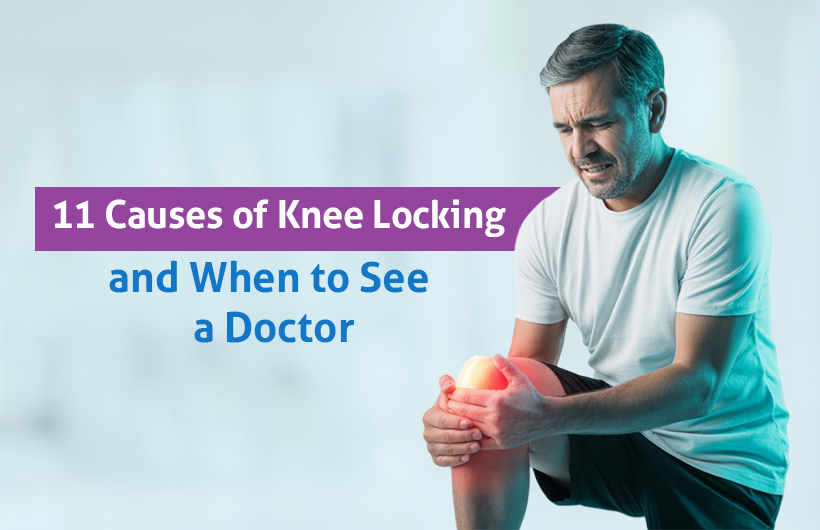Knee locking is a condition where your knee suddenly becomes stiff, making it difficult—or even impossible—to bend or straighten the joint. This alarming symptom often indicates an underlying orthopedic issue that requires timely attention. Knee locking causes, prevention of knee locking, and how to seek medical advice are core principles to knee health and long-term healthy joints.
Recurrent knee locking can be diagnosed and treated effectively by consulting a knee specialist surgeon, such as Dr. Hardik Padhiyar, in Ahmedabad.
Table of Contents
ToggleWhat Is Knee Locking?
Knee locking is an abnormal position in which the knee becomes temporarily stuck in a position. It can be grouped as:
1. True locking: There is a mechanical block in the knee so that it cannot move.
2. Pseudo-locking: Movement is painfully stiff; there is no physical impediment to movement.
The lack of true knee locking normally indicates a mechanical problem in the joint, whereas pseudo-locking normally occurs with inflammation or muscle spasm.
The most common Knee Locking Causes
1. Meniscus Tears
The meniscus is known to cushion your knee joint. The rip can lead to a flap of tissue that gets trapped between bones and locks up suddenly. Usual in athletes, those doing twisting motions.
2. Osteoarthritis
Degenerative processes on the knee may cause bone spurs or cartilage debris that inhibits mechanical motion. Swelling, stiffness and locking periodically are common symptoms.
3. Loose Bodies in the Joint
Pieces of bone or cartilage can enter the knee joint and become trapped between the tibia and the femur, triggering abrupt locking.
4. Ligament Injuries
Ligament damage, including the ACL, may cause destabilisation of the knee. Pseudo-locking can also be caused by swellings and inflammations.
5. Patellar Dislocation
Dislocation of the kneecap can prevent normal knee movement. Even after relocation, residual swelling or cartilage injury may cause locking.
6. Synovial Plica Syndrome
Thickened or inflamed synovial tissue can intermittently catch in the joint, creating a locking sensation.
7. Chondromalacia Patella
Softening or damage of cartilage under the kneecap may cause the patella to track irregularly, resulting in pain, swelling, and temporary locking.
8. Osteochondritis Dissecans
A condition where bone and cartilage segments detach from the joint surface, forming loose fragments that can block knee movement.
9. Inflammatory Arthritis
Rheumatoid arthritis, gout, or other inflammatory conditions can cause joint swelling and crystal accumulation, leading to pseudo-locking.
10. Knee Infections
Infections can result in severe swelling and stiffness, mimicking true locking. Immediate medical attention is crucial to prevent permanent damage.
11. Post-Surgical Scar Tissue
After knee surgery, scar tissue (arthrofibrosis) may restrict movement, leading to stiffness or locking.
Symptoms That Accompany Knee Locking
Other signs often accompany knee locking:
- Swelling or inflammation
- Pain during movement or at rest
- Popping or clicking sounds
- Instability or the knee giving way
- Difficulty walking or bearing weight
Recognising these symptoms early helps in seeking timely treatment and knee locking prevention.
When to See a Doctor
While occasional stiffness may resolve on its own, certain situations require professional evaluation:
- Persistent locking lasting more than a few minutes
- Recurrent knee locking episodes
- Severe pain or swelling
- Inability to bear weight
- History of trauma or injury
Consulting at an orthopaedic hospital in Ahmedabad ensures access to advanced diagnostic tools like MRI or X-rays to detect meniscus tears, ligament injuries, or loose bodies.
How to Prevent Knee Locking
1. Maintain a Healthy Weight: Reduces pressure on knee joints and slows cartilage wear.
2. Strengthen Muscles Around the Knee: Exercises for quadriceps, hamstrings, and calves stabilise the joint.
3. Use Proper Techniques in Sports: Avoid twisting or sudden movements; wear supportive footwear.
4. Avoid Overuse: Balance repetitive activities like running or squatting with rest.
5. Early Treatment for Injuries: Address minor injuries promptly to prevent chronic issues and help in the best knee locking prevention.
6. Regular Checkups: Periodic evaluation by an orthopedic doctor near you can detect early joint problems.
Diagnostic Approach
A knee specialist surgeon typically follows these steps:
- Medical History: Past injury, activity level and symptoms
- Physical Examination: ROM, oedema, pain
- Diagnostics: X-Rays, MRI, CT-scan of cartilage damage or ligament tears, or loose bodies
- Arthroscopy: a minimally invasive operation to diagnose or treat
Treatment Options
Conservative Measures:
- Rest and activity changes
- Pain relievers/ Anti-inflammatory drugs
- Physical therapy to increase strength and flexibility
Surgical Intervention:
- Meniscus tears/Loose bodies Arthroscopically trimmed
- ACL Reconstruction Ligament reconstruction
- Procedures for tracking problems of patellar realignment
Treating with the help of a knee specialist surgeon in Ahmedabad guarantees your treatment is customised to your needs.
Why Dr. Hardik Padhiyar
Dr. Hardik Padhiyar is a reliable Orthopaedics specialist and knee surgery specialist in Ahmedabad. With expertise in advanced medical examination and treatments and patient-centred care, Dr. Padhiyar offers precise diagnosis, proper treatment, and faster healing.
Patients believe in Dr. Hardik because he can do:
- Full analysis of knee injuries
- Use High-tech procedures for meniscus, ligament and cartilage problems
- Take Pre-prophylactic measures: to minimise the recurrence of the locking of the knee
- Individualised long-lasting strategies of joint care
Consultation with Dr. Hardik Padhiyar can mollify the situation and get the knee back on its track, restoring the range of movement and avoiding further complications in the future.
Key Takeaways
Knee lock can cause meniscus tears, osteoarthritis, ligament injuries or other causes.
- Pain, swelling, a popping sensation, or the inability to move the knee characterise the pain.
- Timely treatment in an orthopedic hospital in Ahmedabad is very important.
- Risks are minimised by the use of preventive measures such as building strength, good sports techniques, and weight control.
- Operative treatment can be required, and the experience of the surgeon specialist in the field of knee surgery is the key to the optimum outcome.
For expert consultation, diagnosis, and treatment of knee locking and other orthopedic concerns, contact Dr. Hardik Padhiyar, your trusted knee specialist surgeon in Ahmedabad. Keep your knees healthy, mobile, and pain-free.






